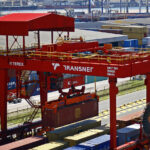The tides of container transport
The tides of container transport
Demurrage and detention (D&D) charges increased drastically during the pandemic. Even though they’re falling again in 2023, there is still much uncertainty within the container transport sector.
“Freight forwarders and shippers are no strangers to the dreaded demurrage and detention charges,” explains Container xChange – an online marketplace and operating platform for container logistics companies – in its piece, Demurrage and detention: Find out how to save money in top ports 2023. “These surcharges are charged by shipping lines and, in recent years, they have become one of the most controversial topics in the shipping industry.
“In short, you pay demurrage and detention charges when you exceed the use of containers. They continue to add up every day on a per-day basis till you deliver the containers back to the shipping lines,” notes the platform. “Such high charges may be ‘unjust and unreasonable’ for freight forwarders. For shipping lines, they ensure the efficient use of their containers.”
Average D&D charges have undergone a year-on-year decline of 25% during 2023, with a significant 14% decrease compared to 2020, as found by Container xChange’s annual Demurrage and Detention Charges benchmark report 2023.
However, there are still 11 ports where D&D fees remain higher compared to 2020: Antwerp, Jebel Ali, Ningbo, Port Kelang, Rotterdam, Shenzen, Singapore, Tianjin, Xiamen, Hong Kong, and Guangzhou.
“There are multiple factors contributing to the inability of these ports to return to normalcy. The significant increase in energy prices coupled with higher labour costs, and escalating land expenses and port fees, have all played a part,” says Chantal McRoberts, director of Drewry Supply Chain Advisors*.
“Furthermore, the implementation of new regulations, particularly those focused on green energy in EU ports, has added to the financial burden. Additionally, the introduction of rules requiring individualised shipment customs clearance, no longer consolidated under one bill of lading, has proven to be time-consuming, as seen in the case of Rotterdam,” she continues.
Christian Roeloffs, co-founder and CEO of Container xChange, adds that its customers have bleak expectations of experiencing a significant peak season with a substantial increase in volumes and prices, as well as potential congestion and associated charges. “However, a key factor in determining whether you must pay detention charges is the efficiency of your processes and monitoring,” he points out. “How quickly can you act and notify your agent or trucker if something goes wrong, such as a container being forgotten at the terminal? Timely communication is crucial in avoiding unnecessary charges. This holds true in any market situation.”
Roeloffs believes that ideally, D&D should be a free market, with the number of free days and the charges being negotiable between parties and carriers, just like in any other free market scenario. “Perhaps what needs regulation is the clarity on when the clock starts,” he expands. “Establishing clear time stamps and determining who bears the burden of proof in cases of congestion, where a container cannot be picked up, would be crucial. Payment should only commence once the terminal is able to release the container. These aspects warrant attention and potential regulation.”
Commenting on the shipping forecast for the upcoming holiday season, Eric Johnson – senior editor of the Journal of Commerce at S&P Global* – says that one non-vessel operating common carrier recently shared its thoughts on a major trans-Pacific shipment.
“We came to know that they don’t expect the demand to recover until after the Lunar New Year next year. This matches what we’re hearing in general,” he reveals. “So, if we assume that’s the case, the focus shifts to operational issues at important ports.”
This includes the need to consider how to avoid delays and/or additional charges once a container has left the terminal. “It becomes more about specific factors in the field that could cause delays in returning containers on time, rather than relying on a big overall economic improvement to drive demand. With each passing day, it seems less likely that there will be a quick demand recovery,” Johnson emphasises.
This view is being echoed throughout the sector. A recent freight forwarder survey conducted by Container xChange reveals a prevailing sentiment of caution and concern amongst freight forwarders globally, as business slowed down during the second quarter of 2023.
The survey also sheds light on forwarders’ expectations for the future, with 64% expressing hope for an improvement in their business, while 15% remain uncertain and 21% hold a downbeat outlook on business revival.
In addition, the survey highlights a concerning trend in container prices: June 2023 marked the lowest average container prices in key supply chain markets such as China, Europe, and the US when compared to the same month in 2022 and 2021. This decline in container prices could indicate a further strain on profit margins for shipping companies.
“The year 2023 started with significant oversupply of containers and high uncertainty in the market, which led to substantial rate erosion. The average container prices have been freefalling and there are no signs of revival as we approach the busiest period in the shipping industry. It is quite evident that the peak season is almost invisible,” Roeloffs says.
Container xChange also asked freight forwarders globally if their business slowed in the second quarter of 2023 compared to the first. The majority (around 65%) confirmed this to be true, while 19% stated that it remained the same, with no uptick in business. Only 16% said that their rate of business had increased.
Furthermore, 64% of freight forwarders expected business to pick up as the peak season approaches, 21% did not expect a business boost, and the remaining 15% were unsure, due to the number of disruptions that have muddied the water.
This is disheartening, following the shipping industry’s high hopes of a return to normalcy at the start of 2023, as China emerged from Covid-19 lockdowns. Container xChange’s Chinese New Year report in February indicated that container prices were stabilising, which raised expectations of a revival after a prolonged period of price lull, and carriers focused on the cyclical practice of repositioning containers from Europe and the US back to China.
However, an oversupply of containers led to depots working at maximum capacity, hampering container movement and reducing depot efficiency. This situation affected depots more in terms of operational inefficiencies than revenue generation.
By the end of the first quarter, North America had witnessed the largest decline in average prices for cargo containers of any region, followed by the Middle East, the Indian subcontinent, and Southeast Asia. The economic and geopolitical scenario deteriorated in the second quarter, with a banking crisis hitting an already struggling global economy grappling with inflation and recession concerns.
By June, the Eurozone had entered a technical recession and the US was facing record-high inflation since 2022. Public sources predict a further 4.5% price drop in the US in 2023.
These events have cumulatively created a ripple effect in the shipping industry, leading to significant fluctuations in shipping container prices.
* In an exclusive webinar held during July, a powerful panel of speakers from Drewry (an independent maritime research consultancy), S&P Global (a market intelligence provider), and Container xChange discussed the impact of D&D charges on shippers worldwide, amidst the changing dynamics of demand and supply for containers on a global scale.
Published by
Jaco de Klerk
focusmagsa




